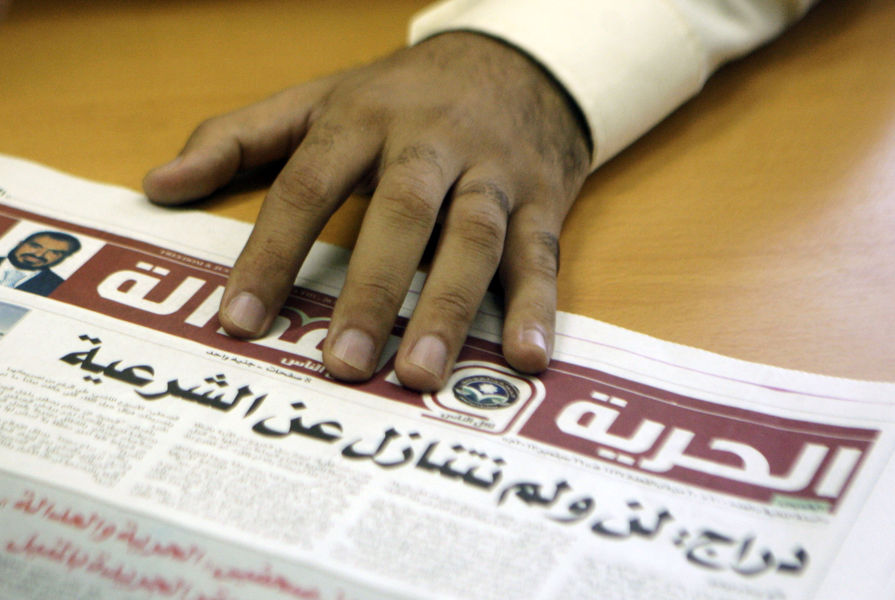Egyptian leaders must act immediately to curb police intimidation of media workers and provide a safer working environment for journalists, who have endured months of attacks from street mobs as well as security agents, the International Press Institute (IPI) said in a report released today.
Since the military-led ouster of Egypt’s democratically elected president last July, at least six journalists have died on the job and dozens of others have been wounded, with some journalists saying they were attacked by mobs while police failed to intervene. Some 20 journalists are now on trial on terrorism-related charges, many of them held in jail for weeks before getting their day in court.
IPI’s “Journalists under siege” report is based on a five-day emergency visit to Egypt by a high-level IPI delegation. The trip began on Jan. 25, three years to the day after the start of Egypt’s Arab Spring revolution, and was prompted by concerns that journalists were becoming an unacceptable target – if not outright scapegoats – for the tumultuous politics that have engulfed Egypt in the past three years.
“As Egypt heads towards new presidential and parliamentary elections in the next few months, we believe it absolutely essential that the interim leaders set the course for the future by ensuring that the police respect journalists’ duty to do their jobs without interference and to recognise journalists’ neutrality,” IPI Executive Director Alison Bethel McKenzie said upon the report’s release. “The government also has the responsibility to inform the public that journalists are not enemies of the state but civilians whose job is to inform the public about what is happening in their society.”
Egypt is now on its second transitional government since the ouster of Mohamed Morsi as president on July 3, 2013. The country’s former housing minister, Ibrahim Mehleb, took over as prime minister on Tuesday.
IPI’s report calls on Adly Mansour, who was tapped as interim president last July, to publicly declare that attacks on journalists – either by street gangs, civilians or the police – are unacceptable and that perpetrators will be prosecuted. Similarly, the report says the president should call on the Interior Ministry to ensure that police respond to threats against journalists and intervene when they are being targeted during demonstrations.
In addition to reports of beatings and abuse at the hands of police officers and vigilantes, six journalists have been killed in the line of duty in the past eight months. The most recent occurred when freelance photographer Mohamed Helmy was shot to death on Jan. 25 while covering demonstrations marking the third anniversary of the beginning of Egypt’s Arab Spring revolution.
Taking into account the approval of a new constitution in January, the report also urges current and future government leaders to move swiftly to revamp the country’s laws so that they adhere to the press freedom guarantees provides in the new Constitution.
Until then, the report says: “The government should state publicly that it will abide by the letter and spirit of the new Constitution – including Articles 70, 71 and 72 that provide guarantees of press freedom, freedom of publication and the independence of the news media, including protections against censorship, confiscation, suspension and closure of news media.”
The report also calls for:
– Appointment of an independent prosecutor to investigate reports that police have beaten detained journalists, violated their rights of access to legal counsel and illegally confiscated and/or destroyed media equipment.
– Training for police and armed forces personnel in recognising accredited journalists as neutral non-combatants in compliance with the country’s international obligations.
It also urges news media to cooperate on journalist safety, through training as well as public-awareness campaigns about the importance of the media and news-gathering. Noting that “Egypt is integral to regional stability and an important crossroad for commerce”, the report urges the country’s leading donors, the European Union and United States, to use their influence to ensure that the Egyptian authorities abide by their country’s commitments to press freedom, freedom of expression and human rights.
The IPI report is based on meetings with a cross-section of media professionals, human rights advocates, government officials and lawyers representing several journalists who have been charged with crimes against the state.
“Times of uncertainty and change amplify the value of free and independent news media,” Bethel McKenzie said of the report. “Egyptian leaders today need to recognise this and further ensure that no civil servant, including those in the security services, flaunt the new Constitution’s guarantees of press freedom, freedom of publication and the independence of the news media.”
>> Click here for a copy of the “Journalists under siege” report.
